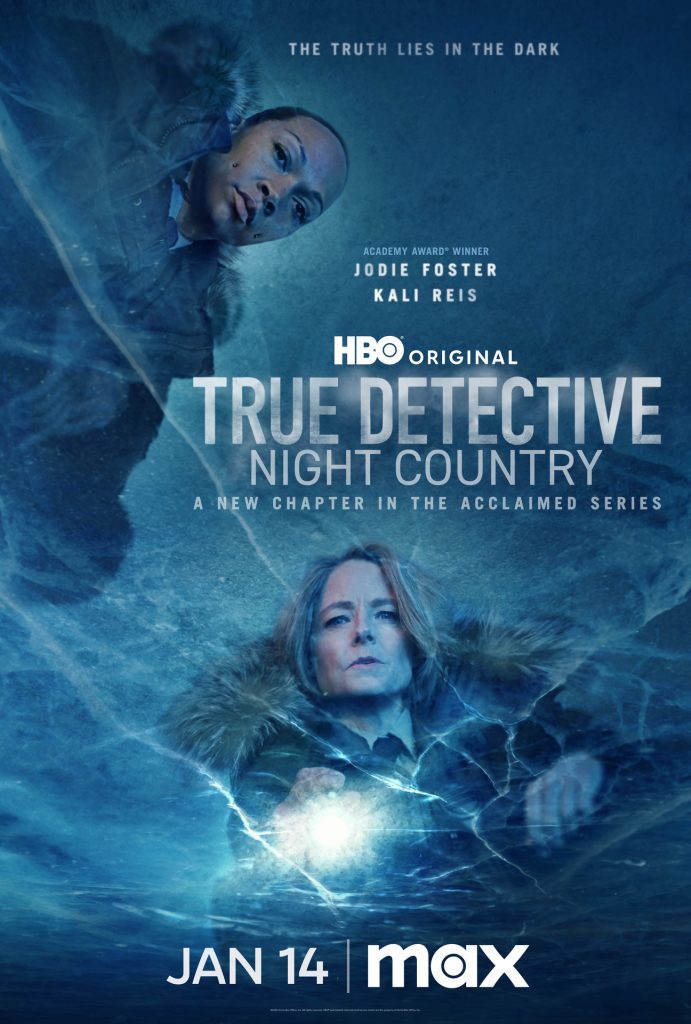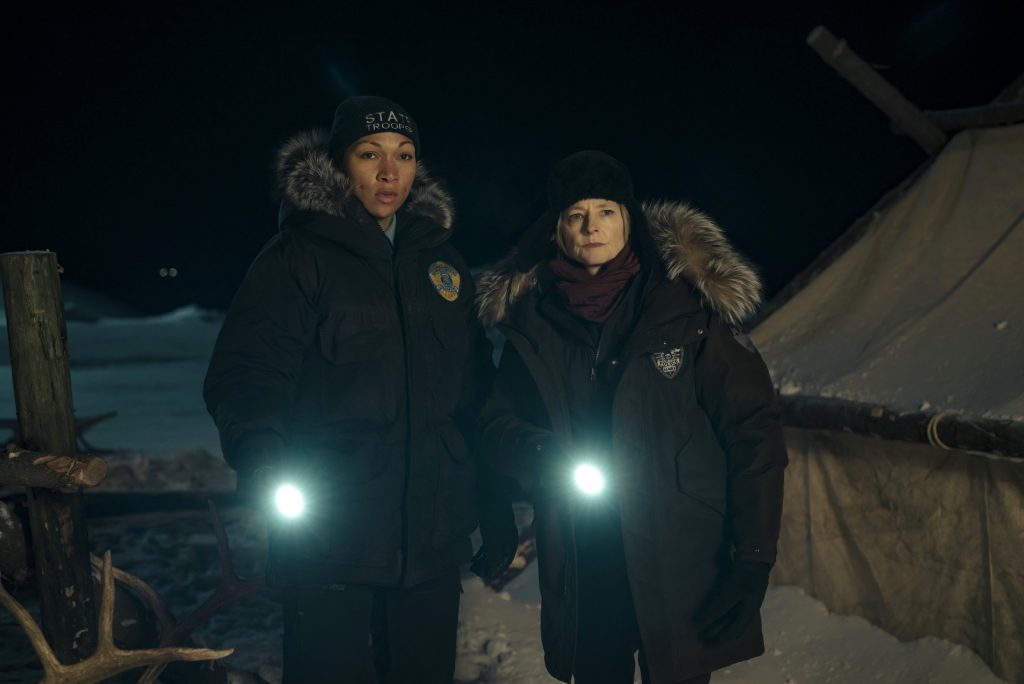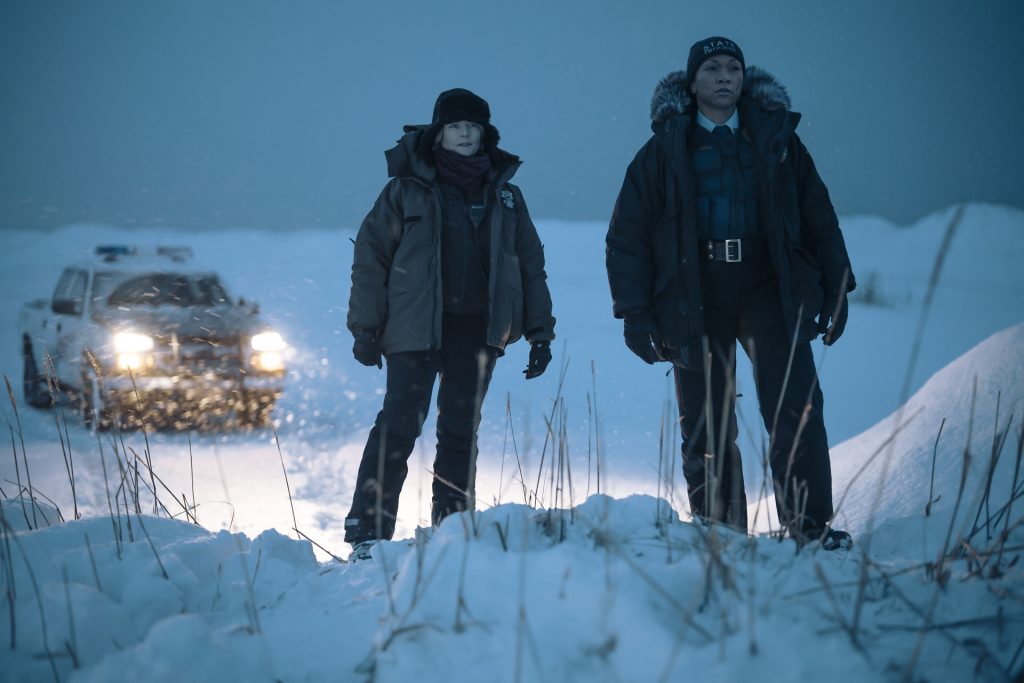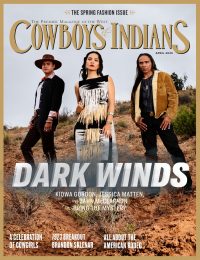The award-winning Native American boxer-turned-actress co-stars with Jodie Foster in the new HBO series.
And now for something completely different: The latest iteration of the anthology thriller True Detective focuses on two women seeking to solve mysteries, unlike the previous three male-oriented editions. But some things never change, and the fourth season reboot — titled True Detective: Night Country, written and directed by Issa López (Tigers Are Not Afraid), and slated to premiere Sunday on HBO/MAX — continues what Hollywood Reporter critic Daniel Fienberg aptly describes as “the uncomfortable intersection of true crime narrative and supernatural undertones.”
The drama unfolds in the fictional town of Ennis, Alaska, where the local mining company and the Indigenous community have been clashing — sometimes in courtrooms, sometimes in barroom brawls — for years. It’s December, just as everyone is preparing for months of 24-hour darkness, when police chief Liz Danvers (Jodie Foster) starts her investigation into the disappearance of eight men who operate the nearby Tsalal Arctic Research Station. Native American state trooper Evangeline Navrarro (Kali Reis) suspects the vanishing has something to do with the years-earlier disappearance of a young Indigenous woman — a never-solved mystery now officially deemed a cold case. When the eight missing men are found dead and frozen solid in an icy grouping that resembles a nightmarish work of painter Hieronymus Bosch, Danvers and Navarro are forced to set aside their long-simmering hostilities and join forces to find who, or what, is responsible.
True Detective: Night Country marks the latest step in Kali Reis’ transition from title-claiming boxer — she’s first Indigenous fighter to ever win the International Boxing Association middleweight crown — to serious dramatic actor. She impressed critics and audience with her debut performance as a retired fighter desperate to free her sister from human traffickers in the indie thriller Catch the Fair One. IFC picked up the movie for release at the 2021 Tribeca Film Festival, where it won the Audience Award — and Reis received a special jury accolade. She was subsequently nominated in the Best Female Lead category of the 2022 Independent Spirit Awards, and in the Breakthrough Performer category of the Gotham Awards.
“My given name ‘Mequinonoag’ means ‘Many Feathers, Many Talents’ in our Algonquian dialect,” Reis said in a prepared statement at the time. “This name was given to me by my mother, Patricia ‘Gentle Rain’ Booker, member and Medicine Woman of The Seaconke Wampanoag Tribe. The strength and wisdom of our Indigenous Women leaders and ancestors runs deep within my warrior veins, alongside the long blood line of resilience in our women.
“As a boxer, I put my heart and spirit into using the ‘medicine’ given to me by the CREATOR through the art of battle in that squared circle. Fighting has turned into a ceremony, ‘my prayer’ representing ALL NATIONS, doing what we Indigenous people have done for centuries — fight and survive. I walk with one Pucker Toe Moccasin and one boxing boot every step of the way.”
Describing her transition into acting, Reis told C&I in a 2022 interview: “I believe with the background I have of being an Indigenous woman — first and foremost, in my boxing career, I am a woman in a man’s world. And then to be extra different, to be an Indigenous fighter — there aren’t many Indigenous people that are put into such a spotlight in boxing. Or film. I think I separate myself from the rest in that aspect, but in a good way. I can use it to my advantage, not because I put on a show, but because that’s where I get my strength from. We’ve always been fighting as Indigenous people, and still we’re here, we’re warriors. And now, going into film — well, film is storytelling. And as Indigenous folk, we are natural storytellers.
“I thrive on the ability and the honor of being able to represent Indigenous and Native people everywhere, because we’re so often forgotten. We need more faces like mine, especially being mixed Black Indigenous. That’s definitely a group of people that doesn’t get understood and represented in things like film or athletics. I think it separates me from the norm, which is almost a double-edged sword. But I’m willing to accept it.”

More recently, Reis noted that while most people would view boxing and acting as “two totally different worlds,” they are actually, in her view, “one and the same. There’s so many parallels. I mean, boxing is such an entertainment sport, or entertainment industry in itself. We have a ring up there, it’s our stage. We have to perform. There’s all kinds of acts. We have to put on a show.”
The biggest difference, she added: While she’s acting, “At least I’m not getting punched in the face. That’s great.
“Boxing is an art in itself, but this is just a different form of expression that I can go into and have a lot more longevity. I can hang the gloves up, but this has so many different avenues in it. So it’s been a beautiful process thus far.”
Oscar-winner Jodie Foster spokes glowingly of her True Detective co-star during a recent online press conference, expressing particular appreciation of Reis’ “tenacity of spirit.”
“That doesn’t come from boxing,” Foster said. “It’s a discipline that’s within you. She’s not afraid of doing it over and over again, and trying again and trying again, and trying it a different way. I mean, she has this fully disciplined awareness, I think.
“Plus,” Foster added with a warm laugh, “I just love her. So there’s that.”

Keis, Foster, writer-director López, and everyone else associated with True Detective: Night Country strove to achieve the highest level of authenticity in depicting Indigenous culture. In at least one case, Keis was able to turn a challenge into an advantage. She is Cherokee, Nipmuc, and Seaconke Wampanoag ancestry — but not Iñupiaq, like Evangeline Navarro. And although she was able to relate to elements of her character, she leaned on leaned on producers Cathy Tagnak Rexford and Princess Daazhraii Johnson for advice on specific details as slang terminology.
“I always got taught that if I’m in somebody’s territory I don’t know, ask permission,” Reis said, “I want to know, ‘What are your traditions? What are your beliefs?’ to honor the people of that land. I just wanted to hear people talk and tell me stories and anything that you feel like sharing. I really want to understand your lifestyle and how you want to be portrayed.”
On the other hand, Navarro is a woman who is “not connected to her Inuit roots,” Reis notes, “because she's not full and she didn't grow up [in Ennis].” So, as much as Reis absorbed how to be authentically Iñupiaq for the role, she also had to create distance in her portrayal. “As much as my Kali brain wanted to pronounce things the right way, [Navarro] didn’t grow up in that, so she wouldn’t sound like that,” she said. “It was a lot of, ‘Let me find out what it is like, but I have to take her away from that because it got taken away from her.’”

For all that, Reis describes Navarro as “a soft badass.”
"She’s so tough on the surface, but she's a little mush,” Reis said. “She cares so much. She knows what the right thing is to do — what looks like the handbook — but in the moment she’s very much like, ‘What feels right? What’s pulling me? What’s pushing me?’
“I think Navarro, oddly enough, is more comfortable than Danvers in that environment because she’s more connected to the area, to the land, to the spiritual aspect and the other side of things. One of Navarro’s strengths is that she is halfway in, halfway out, meaning she’s connected to the spirit world more than Danvers is. But she’s also in the very physical world.”
Kali Reis recently visited the C&I Studio to talk about True Detective: Night Country. And she was a very welcome guest.
PHOTOGRAPHY: Michelle K. Short/HBO












